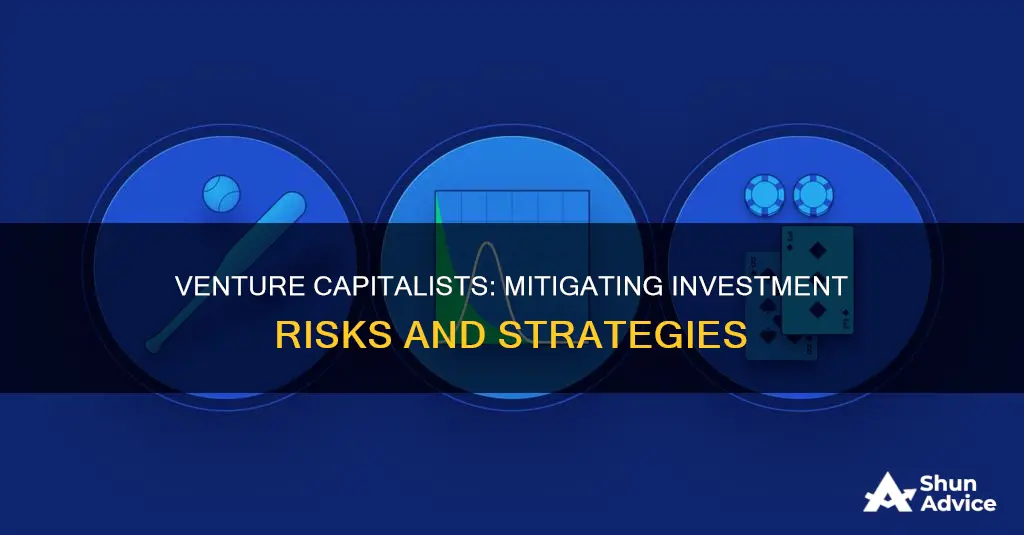
Venture capital (VC) is a high-risk, high-reward form of investment. Venture capitalists provide funding, expertise, and guidance to startups and small businesses with high growth potential. To reduce the risk of their investments, venture capitalists conduct due diligence, diversify their portfolios, and structure deals to minimize risk and maximize returns. They also tend to invest in competitive industries with forgiving markets, and they may include contract language to ensure they get their money back in the event of a startup failure.
| Characteristics | Values |
|---|---|
| Diversification | Diversifying investments across different sectors, stages, and geographies |
| Due Diligence | Analyzing market opportunities, management team, business model, operations workflow, technology, etc. |
| Transparency | Access to accounting metrics, regular compliance audits, and stakeholder meetings |
| Contract Structure | Ensuring VCs get their money back first in case of startup failure or unfavorable circumstances |
| Hands-On Assistance | Sharing business expertise and lessons learned to chart a lucrative path and course-correct if needed |
What You'll Learn
- Venture capitalists diversify their investments across different sectors, stages, and geographies
- They invest in companies with strong management teams, large potential markets, and distinctive products or services
- Venture capitalists conduct thorough due diligence before investing, analysing market opportunities, management teams, business models, operations workflows, and technology
- They structure deals to minimise risk and maximise returns, such as by negotiating preferred stock with special rights and features
- Venture capitalists may also provide hands-on assistance, leveraging their business expertise to help startups succeed

Venture capitalists diversify their investments across different sectors, stages, and geographies
Venture capitalists typically invest in a portfolio of 10 to 20 companies, with the expectation that one or two of these investments will be "home runs", returning more than ten times the initial investment. They also aim for two to three investments with moderate success, returning between two-and-a-half and five times the initial investment. This diversification strategy helps venture capitalists achieve their overall fund return targets of 20% to 30% annually, despite a high failure rate.
In addition to diversifying across sectors and geographies, venture capitalists also spread their investments across different stages of a company's development. They are usually involved in the startup and growth stages, providing funding to help companies scale up and bring their products to market. However, contrary to common belief, venture capitalists rarely fund startups at their outset. Instead, they target companies that are already generating revenue and need additional capital to commercialize their ideas.
Venture capitalists also conduct thorough due diligence before investing, analysing market opportunities, management teams, business models, operations workflows, and technology, among other factors. They may also include contract language that ensures they get their money back if a startup fails or is sold under unfavourable circumstances.
Where to Find National Savings and Investments
You may want to see also

They invest in companies with strong management teams, large potential markets, and distinctive products or services
Venture capitalists reduce the risk of their investments by investing in companies with strong management teams, large potential markets, and distinctive products or services.
Venture capitalists look for strong management teams when deciding where to invest. A strong management team can effectively execute the company's business plan and make sound decisions. They have the necessary skills and expertise to lead the company and make it successful. Due diligence is a critical process for venture capitalists, and it includes evaluating the management team's capabilities and track record.
Large potential markets are another crucial factor in reducing investment risk. Venture capitalists seek companies with products or services that can appeal to a broad audience and have a substantial addressable market. By targeting large markets, venture capitalists increase the chances of the company's success and higher returns on their investments.
Additionally, venture capitalists look for companies with distinctive products or services that offer a unique value proposition. These companies have a competitive advantage over their peers and are more likely to succeed in the market. Their products or services may provide a new solution or a disruptive approach, making them stand out from the competition.
By investing in companies with these characteristics, venture capitalists can mitigate some of the risks associated with their investments. They aim to balance the high risks of investing in early-stage companies with the potential for high rewards.
Small Investments in India: Where to Begin?
You may want to see also

Venture capitalists conduct thorough due diligence before investing, analysing market opportunities, management teams, business models, operations workflows, and technology
Market opportunities analysis involves evaluating the target company's industry, competitors, and market demand for its products or services. VCs assess the potential for growth and the competitiveness of the market. They look for companies with a large potential market and a unique product or service offering a solid competitive advantage.
Management team analysis is crucial, as the capabilities and experience of the team can significantly impact the company's success. VCs assess the qualifications, track record, and ability to execute the business plan of the management team.
Business model analysis involves evaluating the company's revenue model, cost structure, and overall profitability. VCs look for scalable and sustainable business models with the potential for high returns.
Operations workflow analysis involves examining the company's internal processes, including production, supply chain, and logistics. VCs assess the efficiency and effectiveness of these processes, ensuring they support the company's growth objectives.
Technology analysis is critical, especially in the technology sector. VCs assess the company's technological capabilities, including intellectual property and patents, and whether the technology is scalable and can provide a competitive edge.
By conducting thorough due diligence and analysing these key areas, venture capitalists can make more informed investment decisions, reducing the risk of their investments.
Understanding Investment Manager Research: Strategies and Insights
You may want to see also

They structure deals to minimise risk and maximise returns, such as by negotiating preferred stock with special rights and features
Venture capitalists (VCs) are known for their risk-taking, but today's VCs are more like conservative bankers, carving out a specialised niche in the capital markets. They aim to earn superior returns on investments in inherently risky businesses. To do this, they structure deals to minimise risk and maximise returns.
VCs invest in companies with high growth potential in exchange for an equity stake. They tend to target firms that are already generating revenue and need more funding to commercialise their ideas. VCs will buy a stake in these firms, nurture their growth, and aim for a strong return on investment. They typically look for companies with a strong management team, a large potential market, and a distinctive product or service with a solid competitive advantage.
One way VCs structure deals to minimise risk and maximise returns is by negotiating preferred stock with special rights and features. Preferred stock is a class of ownership in a corporation that has a higher claim on assets and earnings than common stock. In venture capital, preferred stock comes with special rights and features that make it more attractive to investors. For example, if the company goes bankrupt, preferred stockholders are paid before common stockholders. Preferred stock will also typically pay a higher fixed dividend, while common stock issued by startups may not pay a dividend at all. By negotiating for preferred stock, VCs balance the high risks of startup investments with potential rewards and protections.
Another way VCs structure deals to minimise risk is by diversifying their portfolio. They aim for a few "home runs" that generate most of the fund's returns, while other investments break even or post losses. By diversifying across different sectors, stages, and geographies, VCs can achieve their target returns even with a high failure rate among their investments.
Understanding Unrealized Equity Gains and Losses
You may want to see also

Venture capitalists may also provide hands-on assistance, leveraging their business expertise to help startups succeed
Venture capitalists (VCs) are known to provide hands-on assistance to startups, leveraging their business expertise to help them succeed. This assistance can come in the form of mentorship, networking services, and strategic guidance. VCs with prior business success can share valuable lessons and insights with startups, helping them navigate challenges and make informed decisions.
VCs often have strong professional networks that they can leverage to benefit their portfolio companies. They can facilitate connections with potential partners, customers, and talented individuals who can contribute to the startup's growth. This networking advantage is a valuable asset for startups, as it can accelerate their growth and help them secure strategic partnerships.
Additionally, VCs may provide strategic guidance to startups by sharing their industry knowledge and expertise. They can offer advice on market trends, business models, and operational improvements. This guidance can be crucial for startups navigating the complexities of their industry and making strategic decisions.
It is important to note that VCs are selective about the companies they invest in. They typically look for startups with strong management teams, large potential markets, and distinctive products or services. VCs aim to invest in companies within industries they are familiar with or have expertise in. This allows them to provide more informed and valuable assistance to the startups they support.
While VCs aim to reduce investment risks through hands-on assistance, they also structure their deals to minimize risk and maximize returns. They diversify their investments across different sectors, stages, and geographies to spread out the risk. VCs understand that startup success can be unpredictable, and they are prepared for both successes and failures in their investment portfolio.
Non-Equity Investments: What Are They?
You may want to see also
Frequently asked questions
Venture capitalists reduce the risk of their investments by investing in good industries, structuring deals to minimise risk and maximise returns, and diversifying their investments. They also conduct thorough due diligence before investing, and may include contract language that ensures they get their money back first in the event of a startup failure or sale.
Due diligence is a process that venture capitalists go through before investing in a startup. It typically involves analysing the market opportunities, management team, business model, operations workflow, technology, and more. Due diligence can also continue after the investment, with transparency measures such as access to accounting metrics and regular compliance audits and stakeholder meetings.
Some common risks associated with venture capital investing include the drain on finances from research and development, technology being challenged, copied, or leapfrogged by competitors, and growth and personnel issues.
Venture capitalists structure their deals to minimise risk by investing in companies with strong management teams, large potential markets, and distinctive products or services with a solid competitive advantage. They also look for investments in industries with which they are familiar and aim for a large equity stake in the company to influence its direction.
Diversification helps venture capitalists reduce risk by spreading their investments across different types of businesses, sectors, and stages of development. This ensures that not all contracts start and end at the same time, providing more stability and allowing for easier long-term performance tracking.







